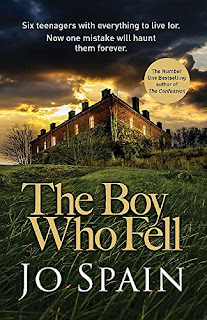The Boy Who Fell – Jo Spain
In fact, the only reason Tom has taken on the promotion is that it gives him a chance to correct that perception and rid the force of its self-serving network of conservatism and bureaucracy. As if to give Tom (and the reader) some indication of what the future has in store for him, in The Boy Who Fell he inadvertently runs up against the omerta of the close-knit community of the wealthy residents of the south side of Dublin when he tries to investigate the death of a boy who has fallen to his death in an abandoned house in one of the city’s wealthy suburbs. Yes, his involvement in the case is partly a favour for a colleague, and his teaming up with the outgoing Chief Superintendent Sean seems to be for old-time’s sake, but when he first looks at the case it’s clear that there’s something very wrong about it.
If you’re familiar with Jo Spain’s work, you’re going to be looking to see just which underlying issue within Irish society the author is going to focus on this time. Domestic violence, even within supposedly respectable affluent neighbourhoods is flagged up early on. Youth problems with drugs and alcohol – again within the context of it being a problem not just in working class areas – could also be a factor. Homophobia and racism raises its head since Daniel Konaté-Jones, the boy accused of killing Luke Connolly, is both gay and of mixed race origin, and significantly the story is set in 2015, around the time of the national referendum on gay marriage. What plays a bigger role than any of these issues is that despite being part of the group of friends with Luke the night he died, Daniel’s working class background means that he is very much the outsider among this group of teenagers.
In a way, all of these factors feed into what lies behind the death of Luke Connolly. That makes it sound like Jo Spain’s thrillers are calculated and moralising, but the truth is that they are far from it. Anyone who writes police thrillers needs to have their finger on the pulse of society, understand where its weaknesses and issues are and identify the underlying issues that give rise to crime. Spain is just very good at bringing to the surface issues that generally aren’t spoken about and aren’t acknowledged. This allows them to weave and become knotted into the very fabric of society and almost impossible to address without untangling and dragging out other problems that some people would prefer to remain hidden. And the people who are able to take measures to ensure those dark secrets remain hidden are usually people with the money and influence.
If there’s one single factor that ties all these various issues together and in whose best interests it’s been best to keep problems buried, it’s not politicians, bankers, police networks or religious institutions – although they have all had their part to play in Spain’s examination of the root causes of crime in Ireland in her books – it’s family. And in The Boy Who Fell, Tom Reynolds finds himself running up against a powerful and influential group of families who are clearly prepared to do whatever it takes to protect the reputation and futures of their children. Tom is going to step on a few toes, put a few noses out of joint – or a few more than usual – but dealing with people like this is what he is going to have to get used to when he takes up his new role of Chief Superintendent.
So there are a number of issues raised in The Boy Who Fell that Tom Reynolds has to deal with, some of them familiar problems that Tom has dealt with before, some of them new ones, and some of them personal and professional ones – although here the domestic problems rarely intrude or feed into the case. What is really interesting this time and the new challenge in the case that Jo Spain presents in The Boy Who Fell is that this time she’s not just digging into the past, but she’s looking towards the future. We know now how those buried problems of old have festered and spread through the social network, but there’s a new generation, teenagers now, who look like they are free of such traditional problems and the world is theirs for the taking, but they face new challenges and for some they may be expectations and ideals that are impossible to meet.
This is another thoughtful and well-considered book by Jo Spain, one that has meaningful real-world context, and not just for Ireland, but for similar problems that exist elsewhere in modern societies having to come to terms with mistakes made in the past. As usual, The Boy Who Fell is also an excellent traditional crime investigation thriller in its own right, Spain very capably taking the reader through various twists and turns of revelations, her characterisation strong and credible. The resolution might be a little less of a high-drama twist this time, but the implications for the future for all of us here are just as chilling as Spain’s previous delving into Ireland’s dark past.




Comments
Post a Comment